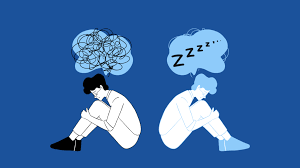Types Of Insomnia Causes And Treatment
Insomnia is a sleep disorder characterized by difficulty falling asleep, staying asleep, or experiencing restorative sleep. There are various types of insomnia, and its causes and treatments can vary. Here’s an overview:
Types of Insomnia:
- Acute Insomnia:
- Brief episodes of difficulty sleeping.
- Often linked to a specific stressful event or change.
- Chronic Insomnia:
- Lasts for at least three nights a week for three months or more.
- Can be caused by various factors such as underlying health conditions or lifestyle.
- Comorbid Insomnia:
- Occurs alongside another medical or psychological condition, such as depression or anxiety.
- Onset Insomnia:
- Difficulty falling asleep at the beginning of the night.
- Maintenance Insomnia:
- Difficulty staying asleep throughout the night.
- Early Morning Awakening Insomnia:
- Waking up too early and being unable to return to sleep.
Causes of Insomnia:
- Stress and Anxiety:
- Worries, stressors, and anxiety can interfere with sleep.
- Depression:
- Depression may lead to changes in sleep patterns.
- Medical Conditions:
- Chronic pain, respiratory problems, and other health issues can contribute.
- Poor Sleep Hygiene:
- Irregular sleep schedules, exposure to screens before bedtime, and a disruptive sleep environment.
- Certain Medications:
- Some medications can interfere with sleep.
- Caffeine and Stimulant Use:
- Consumption close to bedtime can disrupt sleep.
Treatment Options:
- Cognitive Behavioral Therapy for Insomnia (CBT-I):
- Focuses on changing thoughts and behaviors affecting sleep.
- Sleep Medications:
- Short-term use of prescription or over-the-counter medications may be considered.
- Lifestyle Changes:
- Establishing a consistent sleep schedule, creating a relaxing bedtime routine, and maintaining a comfortable sleep environment.
- Addressing Underlying Issues:
- Treating underlying medical or psychological conditions contributing to insomnia.
- Medication Adjustment:
- If insomnia is a side effect of a medication, adjusting the dosage or changing medications may be considered.
- Relaxation Techniques:
- Practices such as deep breathing, meditation, or progressive muscle relaxation can help promote sleep.
It’s essential to consult with a healthcare professional to determine the specific type and cause of insomnia and to develop an appropriate treatment plan tailored to your individual needs. Persistent insomnia should be addressed to prevent potential negative impacts on overall health and well-being.




